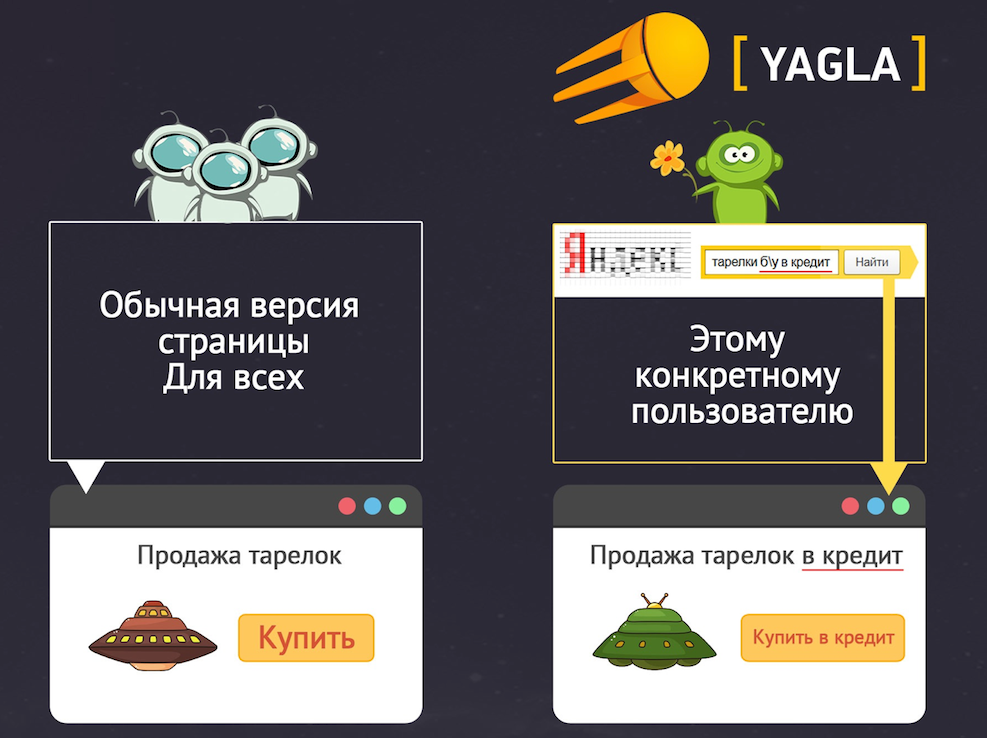Towards Personalization: Responsive Content Systems

Today, personalization rules the ball on the Internet - social networks and search engines have taught network users to see content “honed” to suit their interests. IT companies are forced to adapt to this trend and take into account the interests of their audience, but this is not always easy.
In today's topic, we will talk about systems for creating adaptive content using the example of your Yagla project.
')
What are we talking about
The key to increasing conversions is to personalize the content on the site to the needs and requirements of the user. Responsive content systems are made from a simple web page “multilenders” - the content shown on the screen (headings and text content) to the user is personalized by the search query he got on the site.
Due to this, the visitor spends less time on finding the necessary information (all of it is already here on the screen), and is more likely to be converted into a client.
As you know, search engines encrypt search queries, but this information is available for content ads. Accordingly, the use of adaptive content allows you to increase the return on such advertising and increase conversion.

How it works
The logic of work is simple: if a company, for example, has a campaign on Yandex.Direct, the adaptive content service (for example, Yagla) will receive requests from it via the API and, for their different categories, issue different content (headers, buttons, form signatures, pictures) on the landing page of the company's website. This allows for an order to increase the impact of contextual advertising.

What we work with:
- Yandex.Direct API
- Yandex.Metrica API
What technologies we use:
- PHP framework: Yii
- DB: MySql
- Collaboration and source storage: Git
- CRM: AmoCrm
- Telephony: sipuni.com
- Email distribution: while in the selection process (MailChimp)
- Hosting: now VPS from infobox, but in the coming weeks we plan to move to the server selectel.ru
Who needs it
First of all, to those who use contextual advertising and directs it to landings (in this case, our system gives the best results), small companies (for example, online stores), for whom increasing the return on contextual advertising (with tightly limited budgets) is , sometimes, a crucial condition for the continuation of the business.
Often (contrary to their expectations), such companies face rather weak returns from advertising, in particular, in Yandex.Direct. For example, when setting up a campaign mainly for “high-frequency requests”: such a campaign could cost the firm a “tidy sum”, while small businesses will have to compete with the majority of major players in their market.
We often work with companies for narrowly targeted requests - they are sometimes ignored, but the competition in this area is noticeably lower, and the return (especially for small businesses) can be much more impressive. At the same time, it does not matter whether the company provides its services online or offline: practice shows that a personalized appeal to a visitor (even on the Internet) has a positive effect on sales.
Our service is also useful for those who are not willing to spend time on exploring the functionality of other products or cannot take on a specialist who will be engaged only in promotion. In one of the cases (below) we described the case when the director of the company used our service - a person who, besides increasing the conversion of the site (especially considering that the business is offline), has a host of other, sometimes more urgent tasks. Although there are frequent situations (more about them too below), when Yaglu was successfully used by professional directors.
How effective is this: some numbers from real projects
- SEO agency . Increasing the number of leads 2.5 times in 1 month. Worked: marketing agency. Total setup time: 2 hours ( more about the case).
- Agency for contextual advertising . Additional 330,000 revenue per month due to the sale of advertising campaigns with the ability to customize multilending based on the Yagla service. Worked: agency director ( more about the case).
- Company for the production and installation of plastic windows . The increase in the number of applications by 3.3 times and the achievement of the conversion rate is higher than that of the market leaders in the region (6.1% versus 5.5-6%) in 1.5 months. Worked: commercial director of the company. Total setup time: 1.5 hours ( more about the case).
- Regional tour operator . Conversion rate increase by 2.7 times in 20 days. Worked: company marketer ( more about the case).
- Car service . Increase conversion rate by 5.5 times ( more about the case).
That's all for today. In the following materials, we will continue to talk about useful tools and cases for increasing conversion and promoting business online.
Source: https://habr.com/ru/post/286850/
All Articles